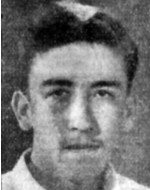Son of Yehudit and Gedaliah, was born on September 3, 1929, in Jerusalem. He studied at the Hebrew Gymnasium in Rehavia and was a good student. At the age of 7-8, he began to compose songs, composed notes for melodies he heard, and his bar-mitzvah recorded the music of the haftara with notes and played it in the flute. Hand-held and built-in microscopes, steam turbine, airplanes, etc. He installed a telescope from eyeglasses. He devoted himself to the Scout movement, guided it, and was very fond of his students. When he needed an exhibit for a scout exhibition, he went to Zedekiah’s cave and built various tools (an ashtray he submitted to the Hechalutz group, with which his father immigrated to Israel on the 25th anniversary of their immigration). When he needed money for a factory in motion, his father promised him a shilling for every chapter of the Bible he would learn by Lev and he studied sixteen chapters in one week. He spent most of his time studying, preparing plays, writing skits for parties, etc. When he was 15 he became active in the Hagana. Was 1.85 meters tall and looked older than his years. During the occupation of the Mandate, he was arrested by an Englishman who asked what he had borrowed and slapped him in the face. In the willingness to sacrifice he saw a true expression of the people living in his country. “We will not have a state if the people will not know how to sacrifice their sons’ selection,” he wrote in his essay. At the beginning of 1948, after completing the real course at the Gymnasium, he went to Palmach training. His parents talked to him that he would enlist in the Nutras and during the rest hours he would read and learn (he was preparing to enter the Technion), but he replied: “This is draft dodging. Worked in the kibbutz’s fish pond, paved a road to Hahabot Habashan and laid irrigation pipes. When the War of Independence broke out, he did not pay attention to the roadblocks, he took leave and went to see his parents, but the road to Jerusalem was already blocked, and he returned to Tel Hai. Yizhar served in the Yiftah Brigade and was considered the best translator in the Galilee in the direction of Veria. On the 11th of Nissan 5708 (April 20, 1948), he participated in the second attack on Nebi Yusha. Of the three machine-gunners deposited to cover the attack, two fell, and Yezar remained the only one. Despite the order to withdraw, he continued to cover up the retreat of his comrades and thus managed to collect most of the wounded. Even after that, he did not retreat and continued to defend the other wounded until he was wounded and fell. A month later, upon the conquest of the fortress, he was brought to rest with his fellow members of a mass grave at the Nebi Yusha cemetery. He was awarded the Medal of Heroism (on the 5th of Tamuz 5709) by Prime Minister David son of Gurion and President Chaim Weizmann. “The three machine-gunners who were assigned to cover up the attacks of the unit fell in two, and in 9562 Private Aarmoni, Yizhar remained alone, and with courage and without respite continued to cover his comrades, and thus the unit managed to collect most of its wounded from the battlefield. After that, he did not retreat, but continued to defend the rest of the wounded with his weapon, preventing the enemy from approaching them, until he was hit and fell on the battlefield, for which he was given the badge of bravery. According to the decision of the Jerusalem City Council on 26 Tamuz 5712, the street near Yizhar’s birthplace was called “Mevo Yizhar”.
